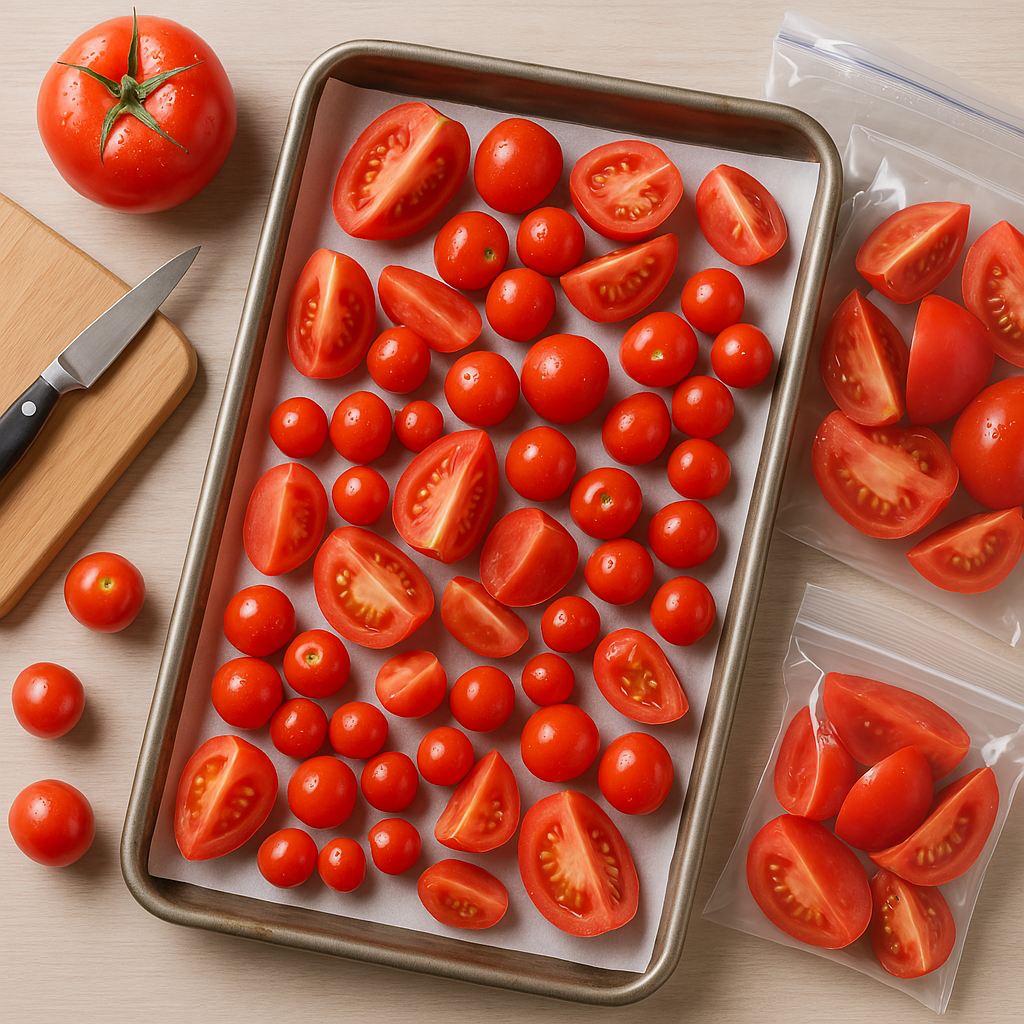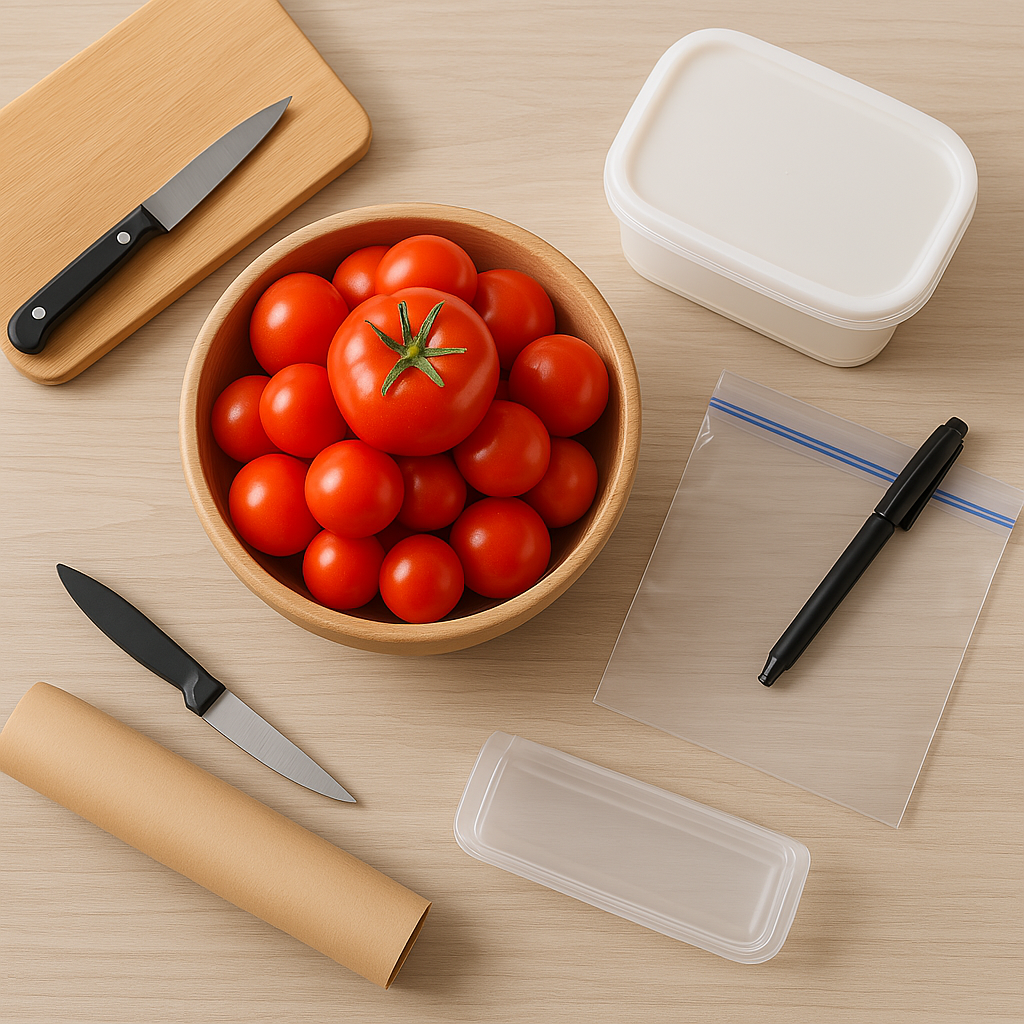If you love having ripe, juicy tomatoes on hand year-round but don’t want the hassle of blanching, you’re in luck.
Freezing tomatoes without blanching is not only possible—it’s simple, fast, and keeps your kitchen cooler.
Whether you’re preserving a garden bounty or stocking up during peak season, this no-blanching method saves time and effort while locking in tomato flavor.
Why Skip Blanching Tomatoes?
Table of Contents

Blanching tomatoes does have its place—it helps preserve color, flavor, and makes the skins easier to remove. But it’s not always necessary, especially if your end use is for cooked dishes. Here are several reasons why skipping blanching might be the right choice for you:
- Time-saving – No boiling water, no ice bath, and no waiting. Just rinse, cut, and freeze.
- Less cleanup – Fewer dishes and less mess in the kitchen.
- Preserves kitchen energy – Blanching requires heat, which can be uncomfortable in warmer months.
- Minimal processing – The fewer steps, the fresher and more natural your tomatoes stay.
For most cooked recipes, the texture and slight differences in appearance from unblanched tomatoes are negligible.
What matters is preserving their fresh-from-the-garden taste—and freezing without blanching does just that.
What Are The Best Tomatoes for Freezing?

You can freeze just about any kind of tomato without blanching. Here are a few guidelines depending on the variety:
- Roma and Plum Tomatoes – These are ideal for sauces and stews because of their low moisture content and dense flesh.
- Cherry and Grape Tomatoes – Great for quick cooking, roasting, or tossing into soups.
- Beefsteak and Slicing Tomatoes – Excellent for sauces and cooking, though their higher water content may make them a bit mushy when thawed.
Whether you’re freezing a bumper crop or making use of a sale at the farmers market, freshness is key. Only freeze tomatoes that are ripe, unblemished, and free from bruises or mold.
Ingredients Required For Freezing Tomatoes

Before you begin, you’ll need the following:
- Fresh, ripe tomatoes
- A sharp paring knife
- Cutting board
- Freezer-safe containers or resealable freezer bags
- Marker or labels
- Baking sheet – optional but useful for flash freezing
Step-by-Step Guide to Freezing Tomatoes Without Blanching

Now follow this step-by-step guide to freeze tomatoes without any extra effort:
1. Wash Thoroughly
Start by rinsing your tomatoes in cool water. Remove any dirt, stems, or garden residue. Pat them dry with a towel or let them air dry briefly.
2. Remove the Core (Optional)
Using a paring knife, cut out the tough core from the top of each tomato. For cherry or grape tomatoes, you can skip this step.
3. Cut as Desired
Depending on your storage needs and future recipes, cut the tomatoes into halves, quarters, or chunks. You can also leave them whole if preferred. Smaller cuts freeze faster and are easier to portion.
4. Flash Freeze
To prevent your tomatoes from sticking together, place them on a baking sheet lined with parchment paper in a single layer. Freeze for 2–4 hours or until solid. This makes it easy to grab only what you need later on.
5. Pack for the Freezer
Transfer the tomatoes into freezer-safe bags or containers. Try to remove as much air as possible from bags to prevent freezer burn. Vacuum-sealing is ideal, but pressing the air out manually works too.
6. Label Clearly
Use a marker to label the bags with the date and contents (e.g., “Roma Tomatoes – Quartered – Sept 2025”). This helps with rotation and prevents mystery bags later in the season.
7. Freeze
Place the packed bags or containers flat in the freezer for easy stacking. Tomatoes will keep well for up to 12 months, though they’re best used within 6 to 8 months for peak flavor and texture.
How to Use Frozen Tomatoes

Frozen tomatoes aren’t ideal for raw salads or sandwiches, as freezing changes their texture, making them soft or mushy. However, they shine in just about every cooked recipe. Here are some ways to use them:
- Soups and Stews -Add frozen tomatoes directly into simmering pots for a fresh, rich flavor.
- Pasta Sauces -Cook them down with garlic, onions, and herbs for an easy homemade tomato sauce.
- Casseroles and Bakes – Add them to dishes like lasagna or ratatouille.
- Curries and Chilis – Frozen tomatoes work well in dishes that need a flavorful base.
Need to peel your tomatoes after freezing? It’s easy. Run the frozen tomatoes under warm water for a few seconds and the skins will slip right off.
Additional Tips
- Freeze in Portions – If you frequently use tomatoes in 1- or 2-cup amounts, pre-portion them into bags or containers to streamline cooking.
- Use Ice Cube Trays – For pureed tomatoes or tomato juice, freeze in ice cube trays, then transfer cubes to bags for precise portioning.
- Roast Before Freezing – Intensify flavor by roasting halved tomatoes with olive oil, garlic, and herbs before freezing. These are delicious in pasta or on pizza.
- Mix Tomato Varieties –Don’t be afraid to combine cherry, roma, and slicing tomatoes in one batch. It adds depth of flavor to sauces.
Benefits of Freezing Over Canning or Drying

While canning and drying are also effective preservation methods, freezing offers unique advantages:
- Lower risk of spoilage since there’s no concern with sealing jars or sterilizing equipment.
- Retains more nutrients because there’s no cooking involved before freezing.
- Faster process from start to finish.
- Less equipment needed—no canner, no dehydrator, no sterilization tools.
Wrapping Up
Freezing tomatoes without blanching is a smart, simple solution for preserving your harvest or stockpile. With just a few steps and minimal prep, you can enjoy the flavor of summer tomatoes long after the season ends.
Whether you’re a gardener, a bulk shopper, or just love the idea of having homemade sauce ingredients ready to go, this no-blanch method is a game-changer.
Leave a Reply